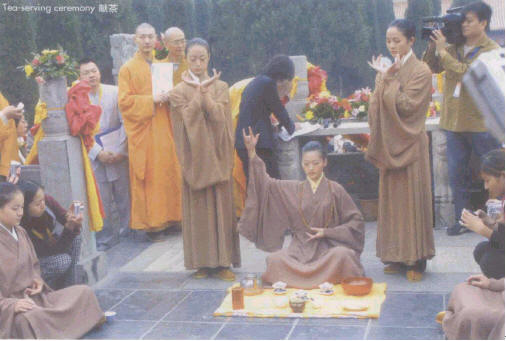禅茶文化的源头是中国河北赵县一座有着1700多年历史的佛教圣地—柏林禅寺。
There is a legend about Chan tea: One day, during the Tang
Dynasty (618-907), two monks traveled very far to visit Zhaozhou (today's
Zhaoxian
County) to consult Master
Congnian, one of the masters of Chan sect of Chinese Buddhism, to discuss what
Chan was. Master Congnian did not reply; rather, he asked one monk ,"Have you
ever been to Zhaozhou?" "Never," replied the monk. "Go and drink the
tea!",Master Congnian instructed. Then the master turned to the other monk and
asked the same question. The monk said:”{have been here ”The master said: "Go
and drink the tea!"
At that point, the high-ranking monk who had ushered the two
monks into the room, asked Master Congnian :" Master, why did you tell both of
them to go and drink the tea, regardless if they have been here before?" Master
Congnian spoke the name of the high-ranking monk, who responded. Then the master
said: "Go and drink the tea!"
The instruction to "Go and drink the tea!" and a cup of Zhaozhou
tea reflect the Chan mindset of the master. This well-known story promotes the
essence of tea, from daily life to spiritual life. People who drink tea can gain
inspiration and enlightenment simply by appreciating and tasting the color,
perfume and flavor of the tea.

Tea is the embodiment of Chan in secular life. The Venerable
Master Jinghui, Vice- Chairman of the Chinese Buddhist Association and presenter
of Chan's Way of Life, a spiritual therapy proposed for modern people trying to
skillfully integrate the practice of Chan into the context of everyday life, has
a wonderful explanation for the culture of Chan tea. As part of Chinese culture,
he says, Chan tea culture is both the real and sublime traditional Chinese
culture in daily life; in traditional Chinese culture, Confucianism calls for
morality, or being upright; Taoism, integrity; and Buddhism, harmony. The
essence of Chinese tea culture can be described as "elegance." The words
"upright, integrity, harmony and elegance" speak mainly of the spirit of
traditional Chinese culture. The combination of these four virtues is the
essence of Chan tea culture.
Tea culture has evolved into diverse styles in the process of
spreading throughout the world. For example, the ceremony of serving tea varies
from nation to nation. Religious rituals, practical rituals and art performances
are emphasized in Japan Korea and China, respectively. Master Minghai,
abbot at Baffin Temple, says even though the tea culture has become
diverse its birthplace is in China.
(摄影 晋永权)